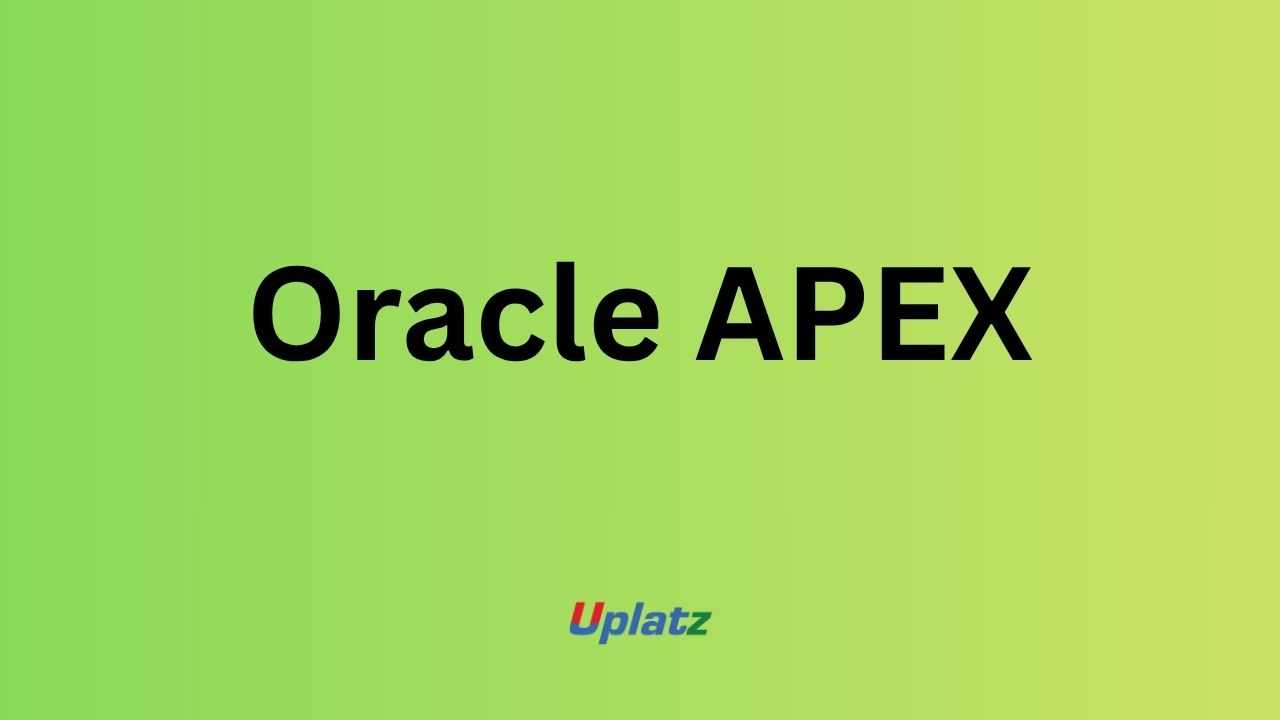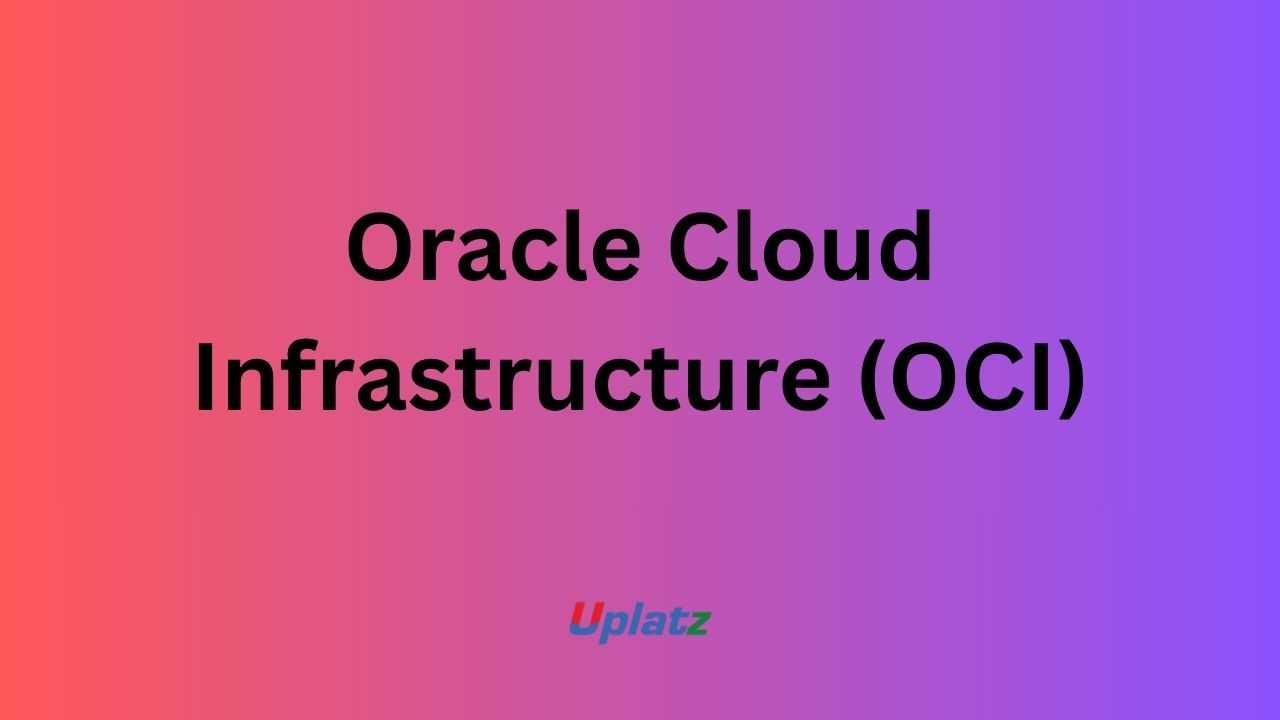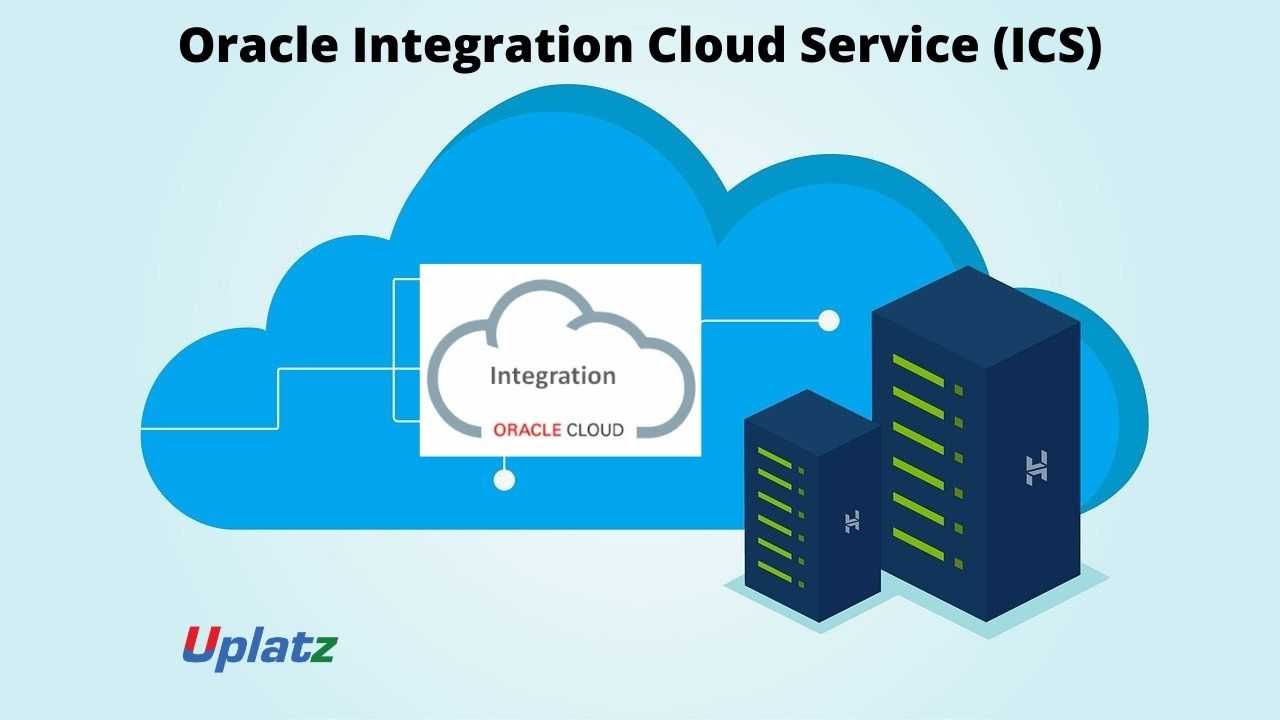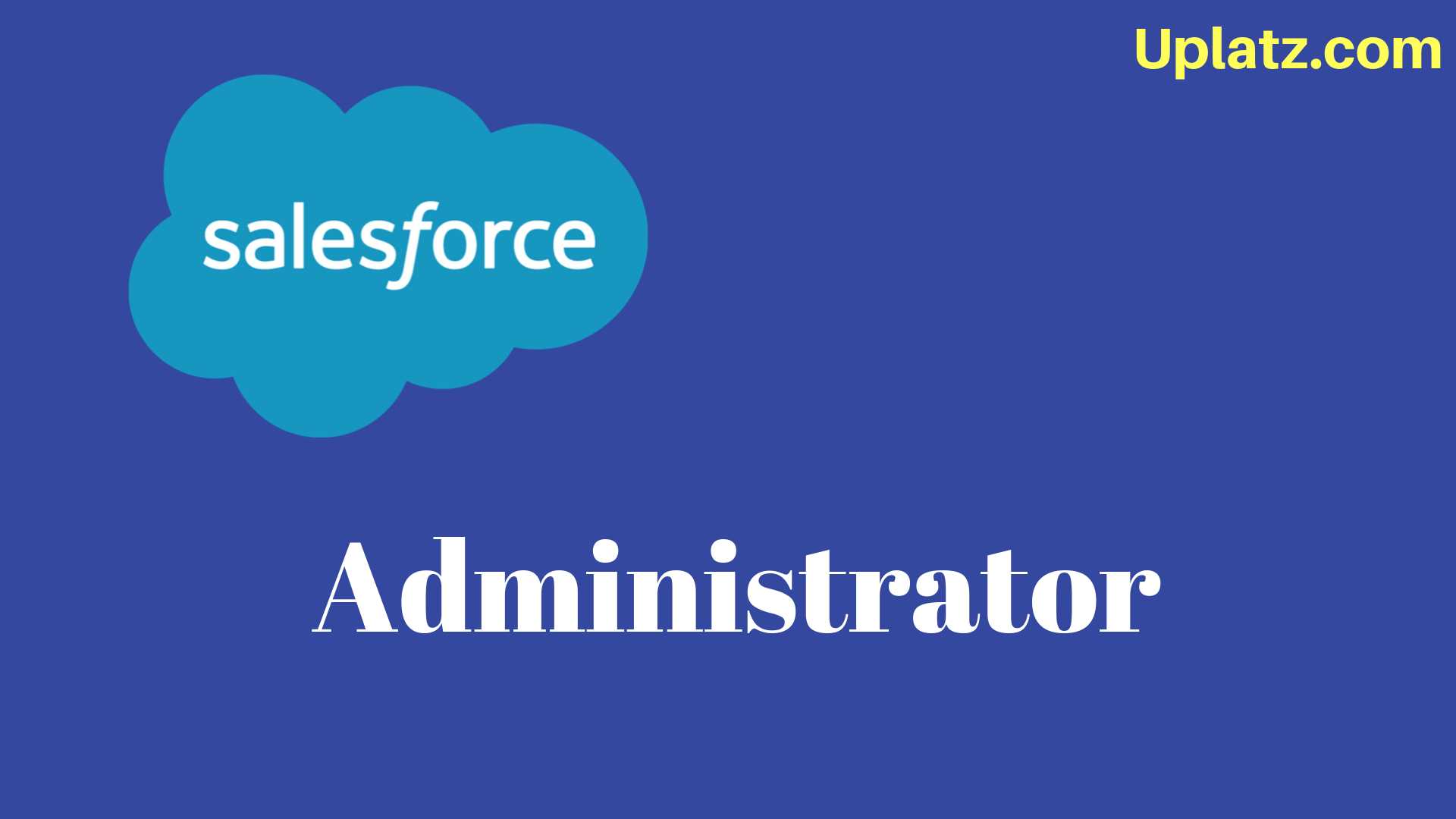Oracle APEX – Low-Code Application Development
Design, Build, and Deploy Modern Web Apps Faster with Oracle’s Powerful Low-Code Platform Price Match Guarantee
Full Lifetime Access
Access on any Device
Technical Support
Secure Checkout
Course Completion Certificate
Price Match Guarantee
Full Lifetime Access
Access on any Device
Technical Support
Secure Checkout
Course Completion Certificate
 97% Started a new career
BUY THIS COURSE (
97% Started a new career
BUY THIS COURSE (GBP 12 GBP 29 )-
 87% Got a pay increase and promotion
87% Got a pay increase and promotion
Students also bought -
-

- Oracle Cloud Infrastructure (OCI)
- 10 Hours
- GBP 12
- 10 Learners
-

- Oracle ICS (Integration Cloud Service)
- 20 Hours
- GBP 12
- 58 Learners
-

- Salesforce Administrator
- 5 Hours
- GBP 12
- 230 Learners

Oracle Application Express (APEX) is Oracle’s flagship low-code development platform that empowers individuals and enterprises to design, build, and deploy secure, scalable, data-driven web applications — all with minimal coding. From automating complex business workflows to creating interactive dashboards or full enterprise systems, APEX enables rapid application delivery with a declarative, drag-and-drop approach that anyone can master.
With Oracle APEX, developers and business users can transform ideas into powerful applications in record time, combining the simplicity of visual design with the performance, reliability, and security of the Oracle Database. It’s the ideal platform for building enterprise-grade, cloud-ready applications that require speed, flexibility, and professional quality — without the heavy cost or complexity of traditional development.
The Oracle APEX – Complete Online Course by Uplatz provides an end-to-end journey through the APEX ecosystem. You’ll learn to design responsive web applications, connect them to SQL data models, implement REST APIs, secure them with built-in authentication, and deploy them confidently. Every lesson combines theory, practical labs, and real-world examples, ensuring you not only understand APEX but can apply it professionally in Oracle environments.
By the end of this course, you’ll have the skills to build, customise, and deploy fully functional applications using Oracle APEX — unlocking the power of Oracle Database and low-code development for enterprise innovation.
🔍 What is Oracle Application Express (APEX)?
Oracle APEX (Application Express) is a browser-based, low-code development framework integrated directly into the Oracle Database. It allows you to build professional, data-centric web and mobile applications using declarative components, point-and-click logic, and SQL integration — with no need for complex coding or external servers.
It’s designed for rapid application development (RAD), enabling users to quickly model data, define workflows, and publish production-grade applications from a single interface. APEX leverages the Oracle Database engine, ensuring high performance, robust data security, and enterprise scalability — all within a web browser.
Core Capabilities of Oracle APEX:
-
Rapid Application Development: Build apps visually using pre-built forms, reports, charts, and UI components.
-
Database-Driven Architecture: Directly connect to Oracle tables, views, procedures, and data sources.
-
Declarative Design: Configure logic, validations, and triggers without writing extensive code.
-
REST API Integration: Connect seamlessly to external systems and data sources.
-
Built-In Security: Benefit from robust authentication, authorization, and session control.
-
Full Extensibility: Enhance functionality using PL/SQL, JavaScript, CSS, and plug-ins.
With APEX, developers can go from concept to deployment in days, delivering responsive, secure, and cloud-ready solutions that meet real-world business demands.
⚙️ How Oracle APEX Works
Oracle APEX operates entirely within the Oracle Database environment, using SQL and PL/SQL as its core logic engines. Every APEX application runs natively inside Oracle Database, ensuring close data integration, high performance, and low maintenance.
The Development Lifecycle in APEX:
-
Workspace Setup: Create isolated workspaces in Oracle Database or Oracle Cloud Infrastructure (OCI) for development and testing.
-
Data Modeling: Use SQL Workshop to design tables, relationships, constraints, and sequences.
-
Application Builder & Page Designer: Drag and drop components like forms, charts, and reports to build your app visually.
-
Shared Components: Manage themes, templates, menus, and authentication schemes reusable across multiple pages.
-
Logic & Automation: Add declarative workflows, validations, and triggers — or extend with custom PL/SQL logic.
-
Testing & Debugging: Utilise APEX’s built-in debugger, performance monitoring, and feedback tools.
-
Deployment: Deploy applications directly to Oracle Cloud, on-premise servers, or autonomous databases.
Because APEX is built directly on top of the Oracle Database engine, it benefits from inherent security, scalability, and performance, making it the preferred low-code platform for enterprise application development.
🏭 How Oracle APEX is Used in the Industry
Oracle APEX has gained widespread adoption across sectors — from small startups to Fortune 500 enterprises and government agencies. Its flexibility and low-code efficiency make it ideal for both enterprise-grade systems and departmental applications.
Common Use Cases:
-
Internal Enterprise Applications: HR portals, approval workflows, and inventory systems.
-
Data Dashboards & Reports: Visual analytics with interactive charts connected to Oracle or external data sources.
-
Workflow Automation: Digitising manual business processes into web-based interfaces.
-
Customer & Partner Portals: Secure role-based portals for business collaboration.
-
Legacy System Modernisation: Migrating Oracle Forms, Excel, or Access applications to the web.
Global leaders like GE Aviation, Cisco, Crédit Agricole, and the U.S. Navy use Oracle APEX to deliver scalable, cloud-integrated applications faster — accelerating innovation while maintaining enterprise-grade reliability.
🌟 Benefits of Learning Oracle APEX
Learning Oracle APEX equips you with the perfect balance of database knowledge, web development understanding, and low-code innovation — a combination highly sought after in modern IT ecosystems.
Key Benefits:
-
Low-Code Productivity: Build complete applications in hours rather than weeks.
-
Full-Stack Capability: Manage front-end design, logic, and data integration in one platform.
-
Enterprise Integration: Connect seamlessly with REST APIs, Oracle Database, and cloud services.
-
Career Flexibility: Qualify for roles such as Oracle APEX Developer, Low-Code Consultant, or Database Application Engineer.
-
Cloud Deployment: Learn how to host and scale applications on Oracle Cloud Infrastructure (OCI).
-
Security & Compliance: Master APEX’s built-in mechanisms for authentication and data privacy.
-
Customization Freedom: Use CSS, JavaScript, and plug-ins for tailored designs and dynamic user experiences.
By mastering APEX, you gain the ability to deliver secure, data-driven applications that support digital transformation with minimal coding complexity.
📘 What You’ll Learn in This Course
This self-paced course provides hands-on training across all stages of APEX development — from database design to deployment.
Core Learning Areas:
-
Understanding the APEX architecture and workspace setup.
-
Using SQL Workshop for schema design, data loading, and modeling.
-
Building responsive forms, reports, and dashboards with Page Designer.
-
Managing templates, themes, and navigation through Shared Components.
-
Integrating RESTful APIs and external web services.
-
Implementing authentication and authorization schemes.
-
Enhancing design with Universal Theme, CSS, and JavaScript.
-
Debugging and performance optimisation using APEX utilities.
-
Deploying apps to Oracle Cloud or on-prem environments.
-
Completing a Capstone Project simulating a real client application.
Every module includes video tutorials, assignments, and practice exercises, ensuring you build both technical confidence and design fluency.
🧠 How to Use This Course Effectively
-
Start with Fundamentals: Set up your workspace and learn APEX architecture.
-
Follow the Sequence: Build progressively from SQL integration to application design.
-
Practice Regularly: Recreate examples in your own environment to reinforce learning.
-
Experiment with Design: Modify templates, colours, and layouts using CSS or Universal Theme.
-
Explore Integrations: Connect your app to REST APIs and test real-time data exchange.
-
Focus on Security: Understand access control, roles, and data protection.
-
Complete the Capstone: Build a full-featured business app to demonstrate your mastery.
👩💻 Who Should Take This Course
This course is ideal for anyone looking to bridge the gap between database management and modern web application development.
Recommended For:
-
Oracle Developers & DBAs modernising data applications.
-
Business Analysts & IT Professionals automating business processes.
-
Frontend Developers integrating Oracle data into custom web apps.
-
Students & Beginners learning web development through low-code tools.
-
Organizations digitising workflows or transitioning to Oracle Cloud.
No prior web-development experience is required — this course covers everything from beginner fundamentals to advanced APEX features.
🧩 Course Format and Certification
This program is self-paced with lifetime access and includes continuous updates aligned with Oracle APEX’s latest releases.
You’ll Receive:
-
HD video lessons and hands-on demonstrations.
-
Downloadable materials — sample apps, templates, and scripts.
-
Assignments and quizzes after each section.
-
A Capstone Project for portfolio building.
-
Community discussion and instructor Q&A access.
After completing the course, you’ll earn a Course Completion Certificate from Uplatz, validating your expertise in Oracle APEX development and readiness for professional low-code roles.
🚀 Why This Course Stands Out
-
Complete Coverage: From fundamentals to deployment, all APEX topics are included.
-
Hands-On Learning: Build real, functional apps during the course.
-
Cloud-Aligned Content: Incorporates Oracle Cloud deployment and integration best practices.
-
Beginner-Friendly: Suitable for both technical and non-technical learners.
-
Career-Focused: Provides practical skills to launch or enhance your Oracle development career.
By completing this course, you’ll gain the confidence to design, build, and manage enterprise-grade applications that deliver real business value — all using Oracle APEX.
🌐 Final Takeaway
In a business world where speed, agility, and digital transformation define success, Oracle Application Express (APEX) offers the perfect balance of simplicity and sophistication. It empowers developers and business users alike to create robust web applications that are fast to build, easy to maintain, and powerful to scale.
The Oracle APEX – Complete Online Course by Uplatz equips you with everything needed to master the platform — from core concepts and data modeling to customization and deployment. With this knowledge, you’ll be ready to design innovative, data-driven, and secure web applications that drive productivity and transformation within any organisation.
Start your journey today and become a certified Oracle APEX developer ready to lead in the fast-growing world of low-code innovation.
By the end of this course, you will be able to:
-
Understand Oracle APEX architecture and development environment.
-
Create and manage workspaces, users, and applications.
-
Design interactive reports, charts, and dashboards.
-
Build responsive web pages using Universal Theme and Page Designer.
-
Develop form-based and data-driven applications using SQL and PL/SQL.
-
Configure authentication, authorization, and session control.
-
Integrate REST APIs and external data sources.
-
Apply CSS, JavaScript, and HTML for app customization.
-
Debug and optimize applications for performance.
-
Deploy Oracle APEX apps to the cloud or on-premise environments.
Course Syllabus
Module 1: Introduction to Oracle APEX and Low-Code Concepts
Module 2: Setting Up APEX Workspace and Development Environment
Module 3: SQL Workshop and Data Modeling
Module 4: Page Designer – Components, Regions, and Layout
Module 5: Forms, Reports, and Interactive Dashboards
Module 6: Themes, Templates, and UI Customization
Module 7: Authentication, Authorization, and Session Management
Module 8: REST API Integration and External Data Connectivity
Module 9: Debugging, Testing, and Performance Optimization
Module 10: Deployment, Cloud Hosting, and Capstone Project
Upon successful completion of this course, learners receive a Certificate of Completion from Uplatz, validating their expertise in Oracle APEX Low-Code Application Development. This Uplatz certification demonstrates your ability to design, develop, and deploy modern database-driven web applications using APEX’s declarative framework.
The course also aligns with Oracle’s official certifications such as Oracle APEX Cloud Developer Professional and Oracle Application Developer Specialist. The certificate serves as a strong credential for developers, consultants, and database professionals seeking to advance their careers in web and enterprise application development with Oracle technology.
Low-code development is transforming the software industry, and Oracle APEX developers are in high demand across enterprises that use Oracle Database or Oracle Cloud services. Completing this course opens career paths such as:
-
Oracle APEX Developer
-
Full-Stack Developer (Low-Code)
-
Database Application Developer
-
Oracle Consultant / Technical Analyst
-
Cloud Application Architect
Organizations in finance, healthcare, retail, education, and logistics increasingly rely on APEX for building internal tools and customer-facing solutions. With Uplatz certification, learners can work in consulting firms, Oracle partner companies, or freelance markets.
Professionals with APEX expertise typically earn between $75,000 and $140,000 per year, depending on project scope and geographic region. The combination of database management and web application development skills also positions APEX developers for leadership roles in digital transformation and business automation projects.
-
What is Oracle APEX?
Oracle Application Express (APEX) is a low-code platform for building and deploying web applications using Oracle Database. -
What is the main advantage of APEX over traditional development?
APEX allows rapid development with minimal coding while maintaining enterprise-grade scalability and security. -
What are the main components of APEX?
Workspaces, Applications, SQL Workshop, Page Designer, and Shared Components. -
How do you create an application in APEX?
You can use built-in wizards or manually add pages, regions, and reports using the Page Designer. -
What is Universal Theme in APEX?
It’s a responsive design framework that provides customizable templates and layouts for modern web applications. -
How do you integrate REST APIs in APEX?
Using RESTful Web Service References and data sources to connect and consume external API data. -
What is the purpose of Shared Components?
Shared Components store reusable elements like navigation menus, templates, lists of values, and security schemes. -
How does APEX handle authentication?
Through built-in authentication schemes like Application Express accounts, LDAP, or custom methods. -
Can you use JavaScript and CSS in APEX?
Yes, APEX supports front-end customization with JavaScript, jQuery, and CSS for enhanced interactivity. -
How do you deploy an APEX application?
Applications can be exported and imported as SQL scripts or deployed directly to Oracle Cloud environments.









